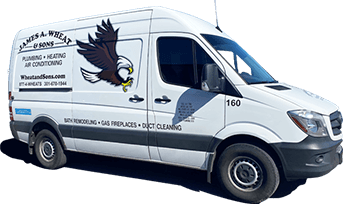Choosing between the different types of heating systems

There are many options when it comes to choosing a heating system for your Montgomery County, Maryland or Washington, DC home. Since your heating system is the biggest draw on your energy bill in the winter, knowing which type of heating system is best for you can go a long way toward saving you money and making you as comfortable as possible this winter.
Forced air heating system
This is the most common heating system, found in many homes in the Maryland and Washington, DC area. The air is heated in a furnace and distributed through the home by a network of ducts. Forced air heating systems can use a variety of fuels, including natural gas, propane, oil or electricity.
Advantages of forced air heating system
- A forced air heating system is the only heating system that can also provide cooling
- Air from a forced air heating system can be filtered, humidified, and dehumidified
- Forced air heating systems are inexpensive
- Forced air heating systems can attain the highest AFUE, making them the more efficient fuel-burning heating systems
Disadvantages of forced air heating systems
- Forced air heating systems require ductwork and take up space within the walls
- Forced air heating systems often have a loud furnace
- Air moved by a forced air heating system may distribute allergens
- Forced air heating systems require regular maintenance and must be filtered
Radiant heating system
This heating system provides the most comfortable and natural feeling heat of any heating system. Radiant heating systems come in a variety of forms, from pot-bellied stoves to in-floor hot water tubing to radiant ceiling panels, and transfer heat from a hot to a cold surface. In-floor systems can be fueled by a natural gas, propane, oil or electric boiler, and heating stoves may use wood or coal.
Advantages of radiant heating system
- Radiant heat systems produce comfortable, even heat that does not dry out the air
- Radiant heat systems can be used with high-efficiency boilers, cutting back on costs
Disadvantages of radiant heating system
- Radiant heating systems take a long time to heat up
- Radiant heating systems can be expensive to install
- Hidden pipes can make maintenance difficult if something goes wrong with your radiant heating system
- Radiant heating systems cannot provide cooling
Hot water baseboard (hyrdonic) heating system
Baseboard heating works similarly to radiant heating, using hot water from a boiler to provide heat by a combination of radiation and convection. With a baseboard heating system, hot water from a boiler is piped into “fin-tube” baseboard units mounted on the floor along walls. The fins increase the surface area of heat dissipation, which makes the unit more efficient. As air is heated by the baseboard unit, it rises until it eventually fills the whole room.
Advantages of baseboard heating system
- Baseboard heating systems stop heating when they achieve the temperature they need, making them highly efficient
- Since they are located along the floor, baseboard heating systems can reduce drafts
- Baseboard heating systems are virtually silent
- Baseboard heating systems can provide simple and effective zone heating
Disadvantages of baseboard heating system
- Baseboard heating units must be completely unobstructed, which could pose challenges for furniture and drapery arrangements
- Baseboard heating systems heat air slowly
- Baseboard heating systems cannot provide cooling
Steam radiant heating systems
This type of heating system is rarely seen today. It is characterized by large cast-iron upright radiators which use steam to radiate heat. Steam heating systems come in two varieties: one-pipe and two-pipe systems. In a one-pipe system, water and steam travel in different directions through the same pipe. In a two-pipe system, steam flows through one pipe and condensed water flows through another. Steam heating systems can be fueled by natural gas, propane, oil or electricity.
Advantages of steam radiant heating systems
- Steam radiant heating systems are efficient and warm spaces quickly
- Radiant heat produced my steam heating systems is comfortable and does not dry out the air
- Old hot water radiant heating systems can be replaced with smaller convection units or wall panel radiators
Disadvantages of steam radiant heating systems
- Steam radiators can be large and unsightly
- Steam radiator locations may inhibit furniture and window coverings
- Steam radiant heating systems cannot provide cooling
Air-source heat pump heating systems
Air-source heat pump heating systems provide heating in the winter by pulling ambient heat from the outside air and moving it into your house while taking the cool air from inside and moving it outside. This type of heating system does not burn fuel to generate heat. Air-source heat pumps are comprised of two pieces: an outdoor unit which consists of an outdoor coil, a compressor, a reversing valve and a fan, and an indoor unit called an air handler. With most air-source heat pumps, heated (or cooled) air is distributed around the house via ductwork.
Advantages of air-source heat pump heating systems
- Air-source heat pumps are very easy to install
- Since they don’t burn fuel, air-source heat pumps are extremely efficient
Disadvantages of air-source heat pump heating systems
- Air-source heat pumps perform better in milder climates and may require a supplemental heater when the temperature drops too low
Geothermal heat pump heating system
Geothermal heat pumps are the most efficient heating systems on the market today. They pull heat energy from deep in the earth and move it into your house, replacing the cool air. The EPA states that geothermal heat pumps can save 30-70% on home heating costs.
Advantages of geothermal heat pump heating systems
- Geothermal heat pumps require no fuel to burn and are the most efficient heating systems available
- In the summer, geothermal heat pumps can provide free hot water
- High energy savings allow geothermal heat pumps to pay for themselves in a few short years
Disadvantages of geothermal heat pump heating systems
- Geothermal heat pumps require a large amount of space to install
- Geothermal heat pumps have very steep install costs
For more information about Gaithersburg heating systems, call James A. Wheat & Sons today! Our certified technicians can answer all of your questions and help you decide which heating system is right for you.

What Can We Do For You?
Contact Us Today!
Homepage Footer


We Treat You Like Family
Let us ensure that you have the highest degree of home comfort and become part of the James A. Wheat & Sons family.
- Same Day Service
- Lifetime Warranties
- Free Service Calls
- Trained Technicians
- Friends & Family Discounts
- And Much More!

